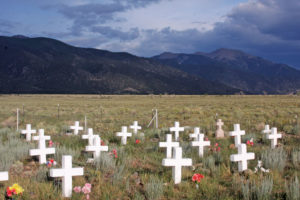By Hal Walter
T.S. Eliot wrote that “April is the cruellest month,” but then he was not referring to a calendar for autism awareness.
Each year I greet the proclamation of Autism Awareness Month as a source of amusement and with a sense of duty. The fact is, every day is about autism awareness around here.
Actually, I have been doing my best to avoid using the term “autism,” though this is nearly impossible when writing about it. Instead, I prefer “neurodiversity.” It is more accurate for one thing, less of a label and more inclusive.
I do not hide my son Harrison or his neurodiversity, as some parents do. I put him, and it, right out in the open because I think it’s important for him to move freely through society, and also for people to know about this issue and have at least some small understanding of it. It may make some uncomfortable. It makes me uncomfortable too, but anything worth doing at all always pushes the comfort zone.
If researchers are correct, we’re going to be seeing a lot more neurodiversity. One MIT scientist predicts half of all kids will have autism by 2025. What if she’s only half wrong?
We started off Autism Awareness Month at the school bus stop. Mary had been allowing Harrison to use her iPhone to play Minecraft since Harrison has broken both his iPads. She would give the phone to him for the ride over to the bus, and I would bring it back. That was the deal, and it was made clear he could not take the phone with him to school.
Many neurodiverse kids are drawn to electronic devices and games – especially Minecraft – because it actually provides a calming effect. While some people view these devices and games as anathema for children, the source of comfort they provide to some autistic people is well-documented and cannot be denied.
On this morning, we drove over to the bus stop and waited. When I saw the bus rolling up over Bluebird Hill, I told him to start getting ready. He suddenly erupted into a shrieking fit. “Oh, no, I didn’t use the phone!”
Apparently he had been listening to the music in the car and looking around at the real landscape instead of creating his own on Minecraft. He screamed and kicked in his seat.
By now the bus was there. He started kicking at me from the back seat. So I got out of the car, walked around to the other side to his door and opened it. The other kids were loading up. He turned upside down in his seat and kicked and screamed some more. I turned and walked away, and he got out and followed me, screaming, toward the bus. I told him to give me the phone. He kept yelling no and starting swinging at me with wild arm slaps.
This went on for some time. There were now cars waiting behind the bus, and of course everyone in these vehicles and all the kids on the bus were getting their lesson in autism awareness. We were at the bus door, and I was trying to get the phone away from him and not get smacked. The bus driver was just sitting there watching all this, painfully aware this fit was throwing him off schedule. I finally pried the phone from Harrison’s hand and he hit me a couple more times. I turned and walked away and he ran and shoved me in the back before turning around and getting on the bus.
Times like this rattle me to the core. How did any of what just happened make sense? He got that mad because he forgot to play Minecraft? And why then would he think it was okay to take the phone with him?[InContentAdTwo]
A couple weeks later, on a Monday afternoon, I got a call from the school principal. In short, Harrison had tried to get cookies out of one of his teacher’s cabinets during class, causing a major disruption. During this episode he managed to strike the teacher and kick a trash can, and he also attempted to keep her from using the phone to call for his aide and then blocked the door. Once again, none of this makes any sense from the neurotypical perspective, but somehow it does from his. Once he had made the terrible mistake of striking out, he thought he could somehow avoid the consequences through further misbehavior. I suppose this is also the same thought process that gets some criminals into deeper trouble than they are already in.
He was sent home early and suspended for the following day. When he woke up the next morning he happily exclaimed, “Today is just like a weekend day!”
Nearly choking on my coffee, I was quick to point out, “Uh, no. This is nothing like a weekend day.” Shortly thereafter I was frantically emailing the school for work assignments to keep him occupied. I got a real lesson in homeschooling that day, spending my time urging him to do his work rather than doing my own. Among the assignments was an apology note to the teacher.
It’s track season and after last year’s foray into cross-country, Harrison is eager to run. Since track meets are chaotic, daylong events with many separate contests, it would be too much for coaches to keep an eye on him under these circumstances. To accommodate his differences, we have a special concession that allows me to bring him for just his event, which is the 800-meter run. I talk to the athletic director prior to the meet, and he gives me a rough idea of what time the 800 run is scheduled.
The first meet of the year was at Sangre de Cristo in the San Luis Valley town of Mosca. We left early that morning and I took in the scenery, trying not to think of the absurdity of driving so far for Harrison to run two laps around the track, especially since I had no idea if he would even run at all.
We got there and frenetic activity quickly triggered a sensory overload. As the wait became almost unbearable, I endured several episodes of strange behaviors, outbursts and inappropriate interactions with people we don’t know. This continued right up to when more than 20 boys finally lined up for the 800-meter race.
Harrison stood with his hand over one ear anticipating the starting gun. When it fired he took off with the rest of the kids, and though he was nowhere near the front he ran from start to finish, which is all anyone can ask. What happened next, though, was something that renewed my faith in humanity, and was well worth the drive.
Kids on his team, and competitors and coaches from other schools, had the awareness that his accomplishment was far from ordinary. They gathered around and congratulated Harrison with “good job” and high fives. He yelled out: “Did I win?”
One boy from another team yelled back. “Yes, you did!”
Actually, I think everyone did.
Postscript: Track continued the following Friday in the town of Center in the San Luis Valley. Harrison added the 400-meter dash to the 800-meter run. The young man who had offered up so much encouragement and congratulations after the Mosca meet was there. He recognized Harrison right away and once again went out of his way to encourage him. Just before the 800 he asked me what was up with Harrison and I told him autism. He responded that he has a sister with Down Syndrome so he totally gets it. “I love her to pieces,” he said. There are some moments that restore my faith in humanity and this was one of them.
Hal Walter is a 30-year resident of Custer County and the author of Full Tilt Boogie – A journey into autism, fatherhood, and an epic test of man and beast.


